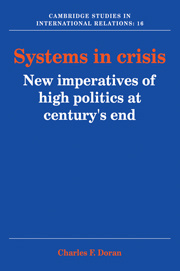Description
Systems in Crisis
New Imperatives of High Politics at Century's End
Cambridge Studies in International Relations Series
Author: Doran Charles F.
Charles Doran develops a theory of the power cycle that reveals the structural bounds on statecraft and the trauma of adjusting to these shifting tides of history.
Language: English
Subject for Systems in Crisis:
Approximative price 35.19 €
Subject to availability at the publisher.
Add to cart
Publication date: 01-2008
316 p. · 15.2x22.9 cm
316 p. · 15.2x22.9 cm
Description
/li>Contents
/li>
Uncertainty is the watchword of contemporary world politics. Monumental changes are occurring throughout the international system and statespeople are wrestling with peaceful solutions to the transformation in relative power of the USA, Soviet Union and China, Japan and in Europe. In this book, Charles Doran proposes a managed solution to peaceful change. He presents a bold, original and wide-ranging analysis of the present balance of power, of future prospects for the international system and of the problems involved in this transformation. Professor Doran demonstrates why such change has often been accompanied by world war, providing new insights into the causes of the First World War. But, he argues, systems change can be both peaceful and secure. Developing a theory of the power cycle, the author reveals the structural bounds on statecraft and shows how the tides of history can suddenly and unexpectedly shift against the state.
Preface; Acknowledgements; Introduction: new perspectives on the causes and management of systems crisis; Part I. Dynamics of State Power and Role: Systems Structure: 1. What is power cycle theory? Introducing the main concepts; 2. Measuring national capability and power 3. The cycle of state power and role; Part II. Dynamics of Major War and Systems Transformation: 4. Critical intervals on the power cycle: why wars become major; 5. Systemic disequilibrium and world war; Part III. Dynamics of General Equilibrium and World Order: 6. Prerequisites of world order: international political equilibrium; 7. World order and systems transformation: guidelines for statecraft; Part IV. Systems Transformation and World Order at Century's End: 8. Systems change since 1945: instability at critical points and awareness of the power cycle; 9. Is decline inevitable? US leadership and the systemic security dilemma; 10. Systems transformation and the new imperatives of high politics; Appendix: mathematical relations in the power cycle; References; Index.
© 2024 LAVOISIER S.A.S.

